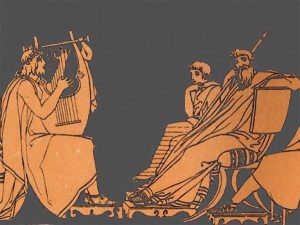Introduction to the music of Ancient Greece
Ancient Greek music refers to the musical traditions and practices of the ancient Greeks, which spanned from approximately the 9th century BC to the 4th century BC. While we have limited knowledge of the specifics of ancient Greek music, ancient texts, artworks, and archaeological discoveries provide some insight into the musical culture of that time.
Music was a very important part of ancient life. At religious ceremonies and other festivities there were musicians and dancers, and the ancient plays had choirs. The ancient Greeks said that the dance was invented to honour the goddess Hera. The Nine Muses gave the gifts of music, dancing and singing to the humans. The muse Calliope gave Man the most precious instrument: the voice. Apollo was also connected with music, as well as Orpheus, Pan, Dionysos, Hermes and the Graces.
In ancient Greek education, music was also a main subject, along with reading, writing, grammar, arithmetic’s and athletics etc. Singing was also used as a means of memorizing and telling odes like the Iliad and the Odyssey. Pythagoras was fascinated with harmony, and worked out a theory on the math’s behind the tones used into modern times.
What must be a characteristic of the ancient music are the Lydian and Phrygian harmonies, influenced by the eastern civilizations to this very day, as well as the many half- and quarternotes.
Key Characteristics of the Ancient music
-
Modes: Ancient Greek music was primarily based on a system of modes, or scales, known as the “Dorian,” “Phrygian,” “Lydian,” and “Mixolydian” modes. Each mode had its own distinct set of pitch intervals and was associated with particular emotional or psychological effects.
-
Instruments: Various instruments were used in ancient Greek music. Some common ones include the lyre, kithara, aulos (double-reed instrument), syrinx (panpipes), and tympanum (a type of drum). These instruments were often used in both solo and ensemble performances.
-
Vocal Music: Singing played a significant role in ancient Greek music. The voice was considered the most important instrument, and vocal performances were accompanied by instruments or performed a cappella. Ancient Greek music featured both solo singing and choral singing, with choral music being an integral part of religious and theatrical performances.
-
Music and Poetry: In ancient Greece, music and poetry were closely intertwined. Many surviving musical compositions were settings of poetic texts, and the rhythmic patterns of the poetry influenced the melodic structure of the music.
-
Function and Context: Ancient Greek music had various functions and was associated with different contexts. It was performed in religious ceremonies, festivals, theatrical performances, and social gatherings. Music was believed to have a profound influence on the human psyche and was used to evoke specific emotions or states of mind.
It’s important to note that our understanding of ancient Greek music is limited due to the scarcity of surviving musical notations and recordings. The majority of ancient Greek musical compositions have been lost to time, leaving us with only fragments and descriptions. However, ongoing research and efforts to reconstruct ancient Greek music provide valuable insights into this fascinating aspect of ancient Greek culture.
History of Ancient Greek Music
 The oldest musical instrument that has been discovered dates back to the Middle Neolithic period (5000 BC) and is a one-hole bone whistle found in Thessaly and exhibited in the Museum of Volos.
The oldest musical instrument that has been discovered dates back to the Middle Neolithic period (5000 BC) and is a one-hole bone whistle found in Thessaly and exhibited in the Museum of Volos.
Next testimonies come from the Cycladic culture of the 3rd millennium BC. The Cycladic figurines (National Archaeological Museum) with performers of the triangle-harp, dulcimer and syringa of Panos bear witness to a lively musical tradition already from this time.
We also have evidence from the Minoan and Mycenaean civilizations (2nd millennium BC) where the lyre, the seistro and the cymbals (zilia) first appear. In the Homeric epics there are many musical references while we know that the Homeric epics themselves were recited by the rhapsodists and sung to the accompaniment of the lyre by the guitar players.
In worship, important figures such as Apollo, Dionysus and Orpheus are directly associated with music.
In archaic times the laws are established (heptapart pieces for flute, guitar and/or song with a strict structure). The 7 strings of the lyre are also established and the musical competitions (guitar, flute and/or singing) begin corresponding to the Olympics. In the classical era, music, having incorporated the musical traditions of neighboring cultures, acquired a specific form and system. Tragedy and comedy are directly connected to music (almost all the text was set to music).
Philosophers such as Pythagoras, Plato and Aristotle, explore the relationship of music with mathematics, philosophy and the soul. Standardized pieces are formed, such as the paean (with guitar accompaniment in honor of Apollo), the dithyrambos (with flute, worship of Dionysus), the hymn, the lament, the hymenaios (wedding song) and the scholion (wine song with flute or barbito).
In the 5th century BC century a “new music” with more variety in sounds, melodies and expression is taking shape. In later times, theoretical texts of music are written, notation crystallizes, new instruments such as the hydraulics are manufactured, Greek music spreads throughout the Hellenistic world, it clearly influences the music of other cultures, such as Rome and the Middle East, and constitutes the international musical system up to the early Byzantine times. Later, both the music of Byzantium and the music of the West were built on this musical tradition whose visible remnants remain alive to this day.
